Top eCommerce Platforms in 2021
The top ecommerce around the world in 2020.
Ecommerce is taking over the world.
If it hadn't become the preferred way of purchasing products and services before 2020, now with the COVID-19 forcing people to stay home, it will only grow in popularity.
So how should an entrepreneur incorporate this economic activity into their business and get a slice of the pie?
Well, good market research is a must. What countries is ecommerce growing the most in? Where is ecommerce saturated? What platforms exist for ecommerce, and which tools are needed?
All of this is important when deciding to enter this market.
In this post blog, we are going to share with you the top eCommerce platforms in 2020 and some stats about the eCommerce market as a whole.
We hope this will aide you in your research when building your next killer eCommerce tool.
The World's Largest eCommerce markets in 2020
China has long overtaken the United States as the biggest eCommerce market in the world. Not only that, China is also the fastest-growing ecommerce market in the world, growing annually at around 35%.
Furtherdown on the list you get the major EU members like Germany and France, the UK and in Asia ecommerce is quite strong in Japan and South Korea.
- China $672 billion (15.9% of total retail sails)
- USA $340 billion (7.5%)
- UK $99 billion (14.5%)
- Japan $79 billion (5.4%)
- Germany $73 billion (8.4%)
- France $43 billion (5.1%)
- South Korea $37 billion (9.8%)
- Canada $30 billion (5.7%)
- Russia $20 billion (2.0%)
- Brazil $19 billion (2.8%)
It is important to note that within these countries you have several different companies responsible for the majority of eCommerce. In the United States it is Amazon, but in China it is Alibaba.
According to eMarketer, the top 10 companies ranked by percentage of US retail ecommerce sales are as follows:
- Amazon 38.7%
- Walmart 5.3%
- eBay 4.7%
- Apple 3.7%
- The Home Depot 1.7%
- Wayfair 1.5%
- Best Buy 1.3%
- Target 1.2%
- Costco 1.2%
- Macy's 1.1%
When it comes to the size of the ecommerce market worldwide, it is growing at astronomical rates.
In 2014 worldwide ecommerce sales totaled $1.3 billion. In 2019 that number was $3.5 billion, having grown an average of 50% each year.
In 2020 worldwide ecommerce sales are expected to total $4.2 billion.
Top eCommerce Platforms in 2020
So you've decided to take the plunge and build an eCommerce business. What platform should you use to build your ecommerce business on?
To get a better sense of what ecommerce tools are popular, we compiled the top platforms into one list. Here are the most popular platforms in 2020.
Remember, popular does not necessarily mean the best. Keep that in mind when testing out which ecommerce platform is best for you.
These statistics are taken from builtwith.com and w3techs market report on Content Management Systems.
1. Woocommerce
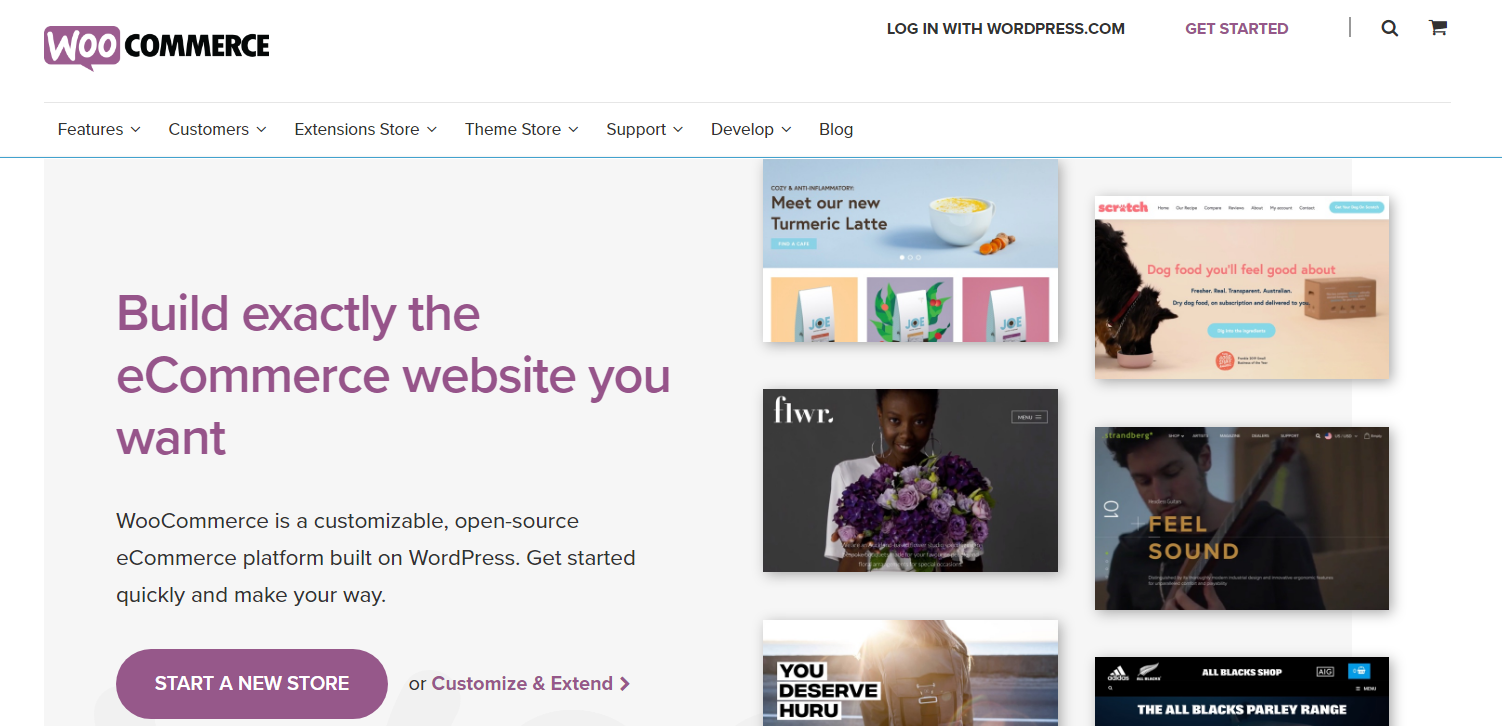
Total live websites: 3,876,748
Pricing: Not available
WooCommerce is a free-to-use plugin for the WordPress blogging platform. It is one of the most popular ecommerce platforms, simply because wordpress is such a popular website builder.
This makes it the biggest rival to Shopify. For any website that is already built on wordpress, and looking to expand into ecommerce, using woocommerce is the easiest way to go since it is already integrated.
2. Wix

Total live websites: 3,800,881
Pricing: Not available
Wix has become a popular website builder because it is free and relatively simple to use when compared to wordpress.
In recent years, it launched its own ecommerce platform, known as Wix Store.
The great thing about Wix Store is how simple it is to build a website and create an online store. All you do is choose a template and drag and drop the various sections of the website into place. As a result, you can have your online store up in less than one hour, at least a basic version.
Wix Store is a great option for small business owners with little technical knowhow that just want to get their physical store online in as little time as possible.
3. SquareSpace

Total live websites: 981,789
Pricing: Not available
Squarespace is similar to Wix, as it is also a simple website builder. It's been around longer than Wix, but for all intense and purposes it is the same.
Just like Wix Store, their equivalent is SquareSpace Commerce. You can build an online store in very little time, convenient for the less techy folk among us.
4. Shopify

Total live websites: 881,088
Pricing: $29-$299
Shopify provides the online entrepreneur with everything they need to run their store. The company has been around since 2006, but it's only exploded in populary in the past few years.
Shopify's selling point is that it not only provides a way to manage your online store, but it also is simple, clean interface for running your marketing and social media. It may offer a more comprehensive solution as a ecommerce platform.
5. OpenCart
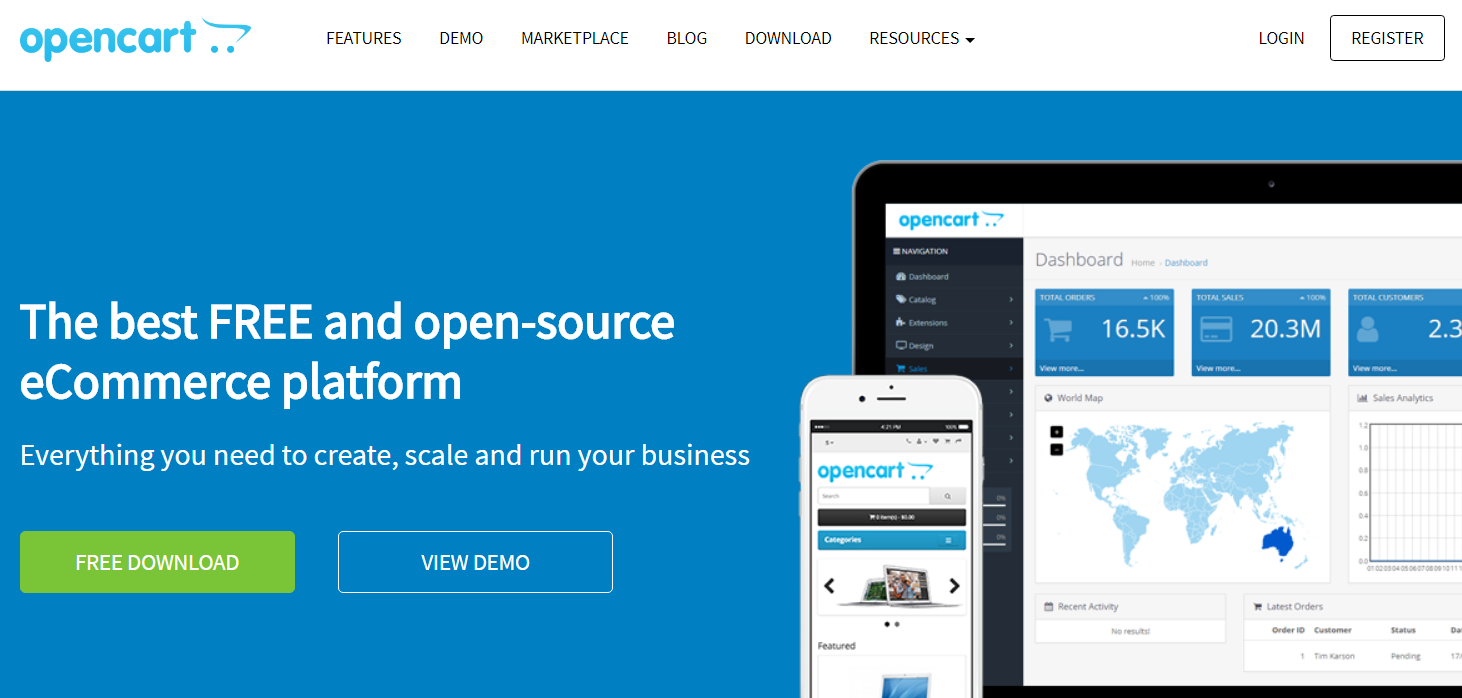
Total live websites: 158,654
Pricing: Not available
One of the earliest ecommerce systems out there, OpenCart was originally developed back in 1998 and saw its first public release the following year. It had a rocky start as it was eventually abandoned before being revived in early 2005.
OpenCart now has around 317,000 live OpenCart sites. Its long history and open-source architecture is conducive for its community of users and developers.
6. Prestashop
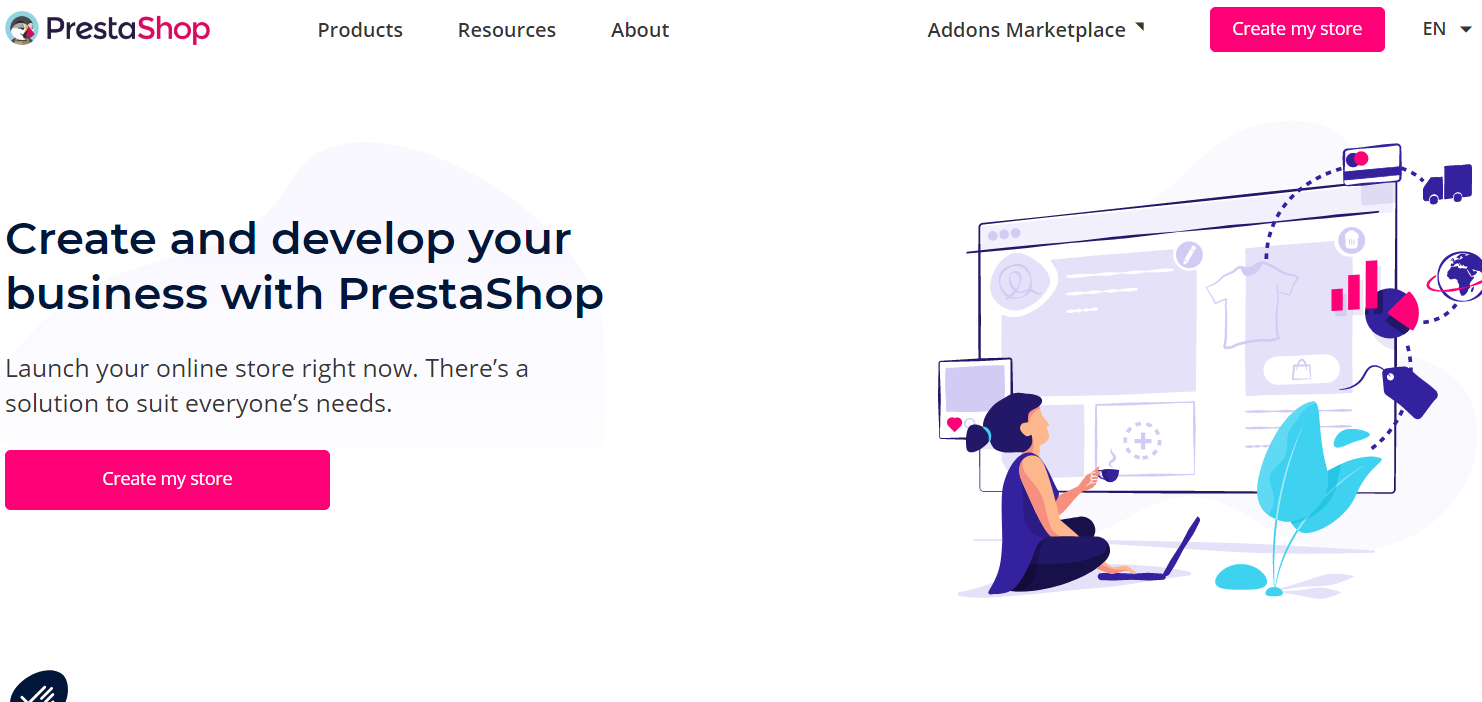
Total live websites: 117,450
Pricing: By quote
Introduced in 2007, Prestashop has been gaining popularity over the past decade with its Prestashop Ecommerce development solutions.
It focuses mostly on reliable online shopping solutions and an amazing user experience for online entrepreneurs with a low budget for establishing an online store.
Prestashop is a good solution for those who need to put up an online store right now without much budget. If you're looking for a fully-fledged store with more advanced features, Prestashop is not the best for that.
7. Magento
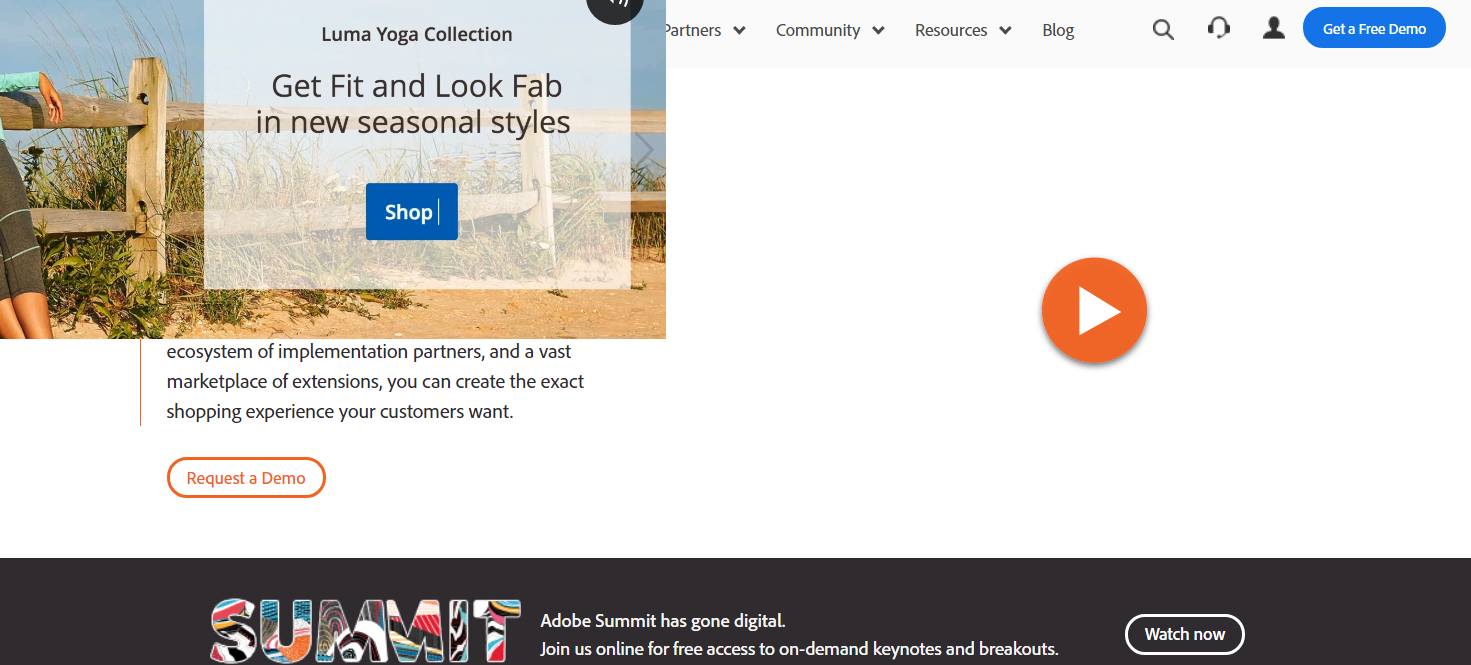
Total live websites: 104,339
Pricing: By quote
While not as popular as WooCommerce and Shopify, Magento is a top alternative for online entrepreneurs who are looking to do things properly in ecommerce.
Initially released in 2008, this open-source ecommerce platform's developer was originally developed by Varien, Inc., which was later acquired by eBay. Varien had previously worked with osCommerce before developing Magento.
Magento offers flexibility with customizability due to being written in PHP. The developers of Magento has since spun out of eBay as an independent company with a new owner in late 2015, and the platform has been gaining traction ever since.
8. ZenCart

Total live websites: 77,440
Pricing: Not available
Based on PHP and using MySQL for its database, Zen Cart is a platform that branched from osCommerce back in 2003. It differs in architecture and some of its core features. It now boasts over 100,000 users with developers from around the world supporting its growing community.
9. OsCommerce
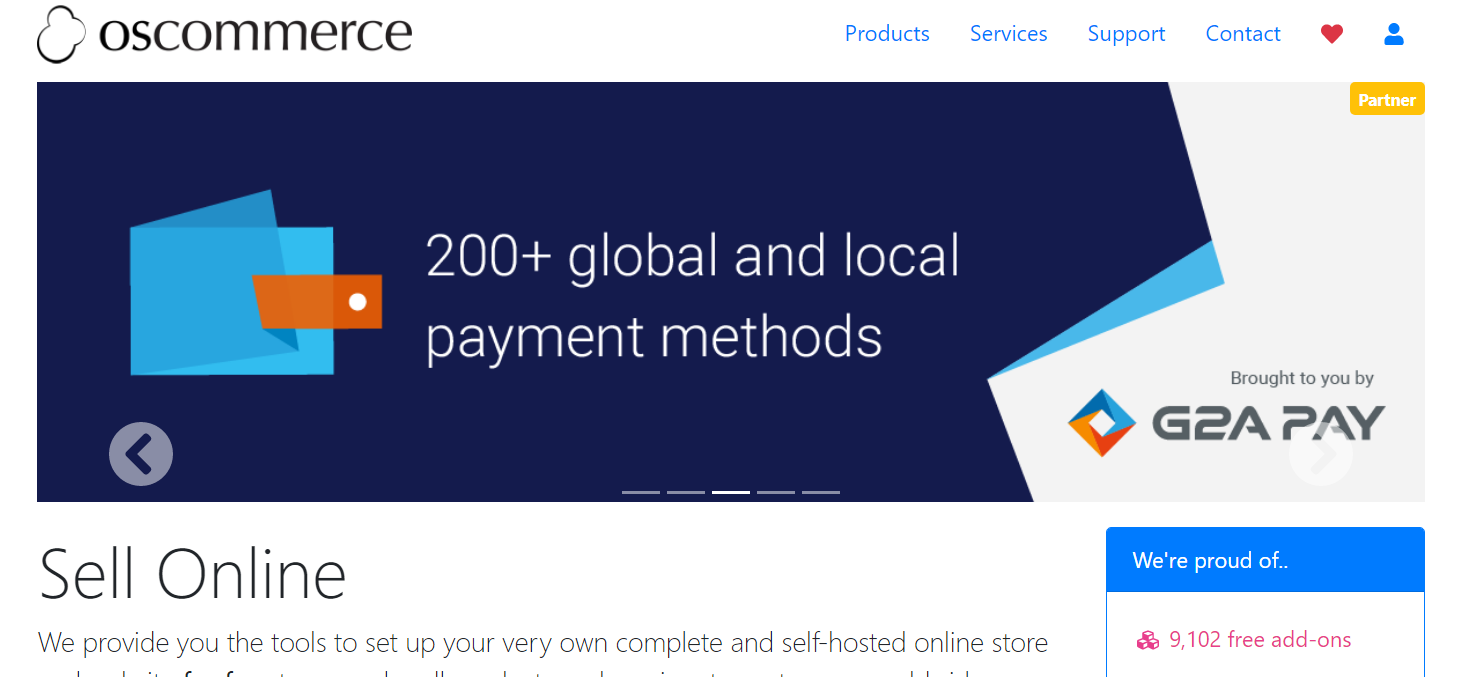
Total live websites: 30,664
Pricing: By quote
With hundreds of thousands of users in its online community, osCommerce is a truly open source and free-to-use ecommerce platform under GNU General Public License. There are over 260,000 different stores running on osCommerce, with 12,800 registered sites under its belt.
This platform is best for those who are just looking to put up an online store without fiddling too much with it. Whether you're simply dipping your toes into ecommerce or running a small to medium online store, osCommerce is a pretty good solution.
10. BigCommerce

Total live websites: 25,135
Pricing: By quote
Built upon the concept of being all-inclusive, BigCommerce seeks to provide everything an online entrepreneur needs to get started with ecommerce in one package. This is opposed to other platforms that may offer bits and pieces of an online store separately.
BigCommerce is a hosted platform with all-inclusive options that competes directly with Shopify and Volusion, as well as non-turn-key options like WooCommerce (along with WordPress), Magento, and others.
11. 3D Cart
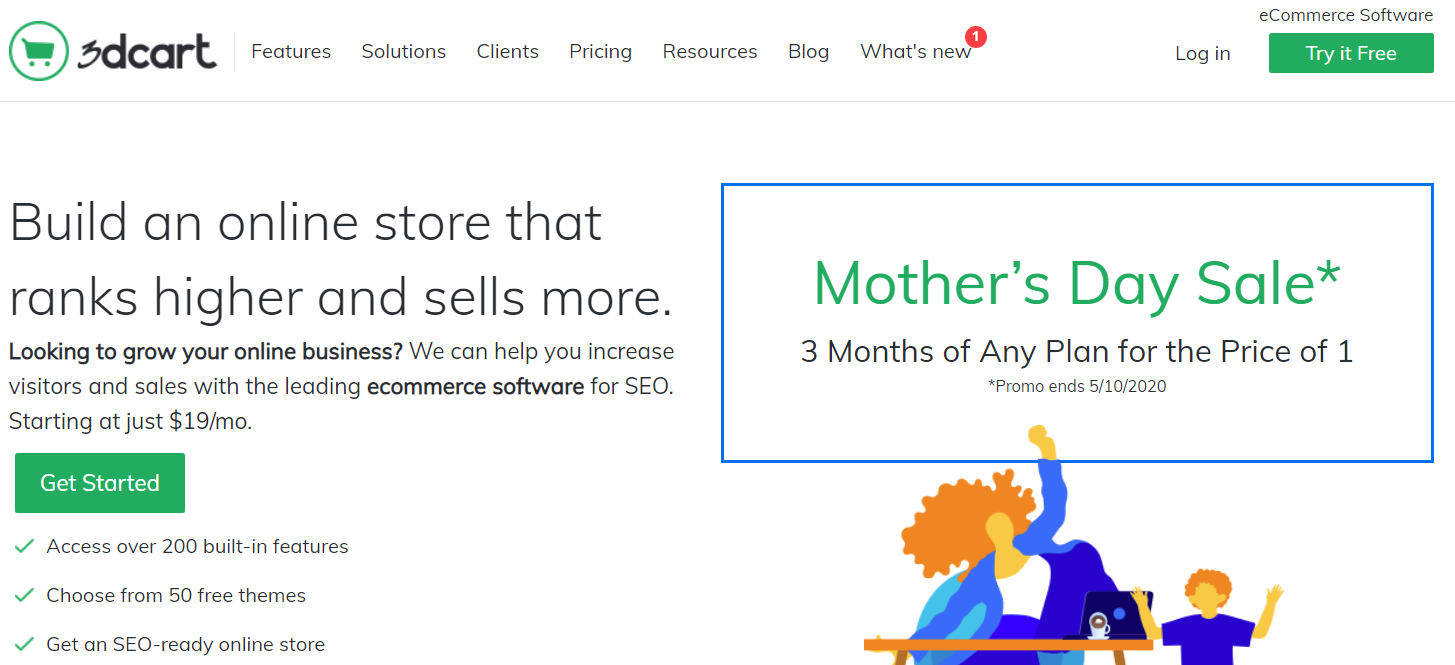
Total live websites: 5,356
Pricing: $19-$229 per month
3D Cart positions itself as ecommerce software combined with SEO. Building your site with 3D Cart and the added SEO optimizations are designed to make your website rank higher than the competition. It starts at just $19 per month.
12. Lightspeed

Total live websites: 2,910
Pricing: $69-$229 per month
Lightspeed is a smaller ecommerce platform, but it offers a lot of integrations that could make it a good fit. Moreover, you can choose the different industries you plan on working in to get specific recommendations for how to build your site tailored for that industry.
Conclusion
These are the twelve main ecommerce platforms in 2020 that websites are using. Remember, just because one is more popular than the others does not necessarily mean it is worse. It's important to keep an open mind when choosing which ecommerce platform will work best for you. It could make or break your business in the long run.
Try Aori
Need to build search ads for your ecommerce store? Check out our ecom tool which uses your product feed to create search ads in the Single Keyword Ad Groups format.
